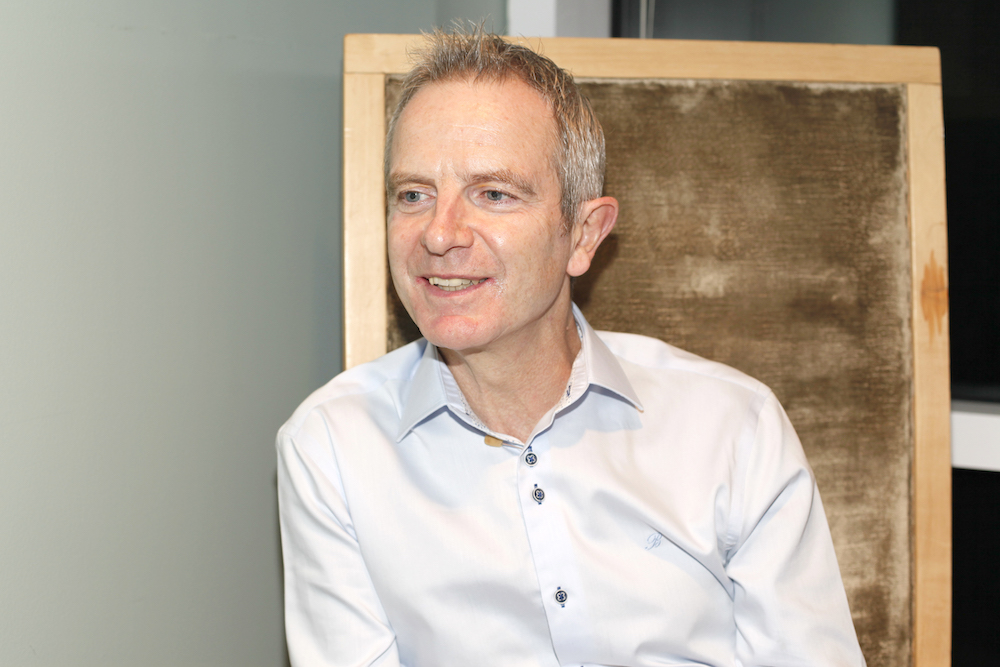
Photo by Aaron Salcido.
John Mulholland is a Dublin-born journalist and the editor of Guardian US. Before taking part in a Zócalo/Getty event titled “Is Journalism About Social Justice?” at the Getty Center in Los Angeles, he paid a visit to the green room to share stories about the teacher who told him not to sing, why he hates driving, and the reason he’d travel back to 1850s Ireland.
What is the last board game you played?
Backgammon.
Do you play that often?
I do play it quite—well, I play it on things like flights and train journeys.
On what device do you do most of your reading?
On a PC or MacBook.
What’s your biggest pet peeve?
Traffic. I hate traffic, which is why I cycle. I’m a cycle commuter. I can’t stand waiting in traffic.
What’s the first line of your obituary?
“He tried.” It’d be the last line, as well.
French fries or onion rings?
Oh, god. Definitely onion rings.
OK, Dublin or Sacramento?
I have to say Dublin.
What’s the difference between reading the news in Dublin or in the U.S.? How do people like their news?
I think the difference is that—and I’d have to be a little bit serious momentarily—but I think the media in the States is much more bifurcated than in Ireland. It just feels much more polarized, much more sectarian. That’s pretty pronounced I think, over here. Not obviously, in its entirety. But, yeah.
What year, past or future, would you like to time travel to?
Well, it might seem an odd thing, but I would actually quite like to travel back to the 1850s in Ireland when the famine took hold, to find out what real hardship meant. And also, that period of Ireland has still left a mark on Ireland’s consciousness and outlook on the world. So, having a glimpse at the people who were caught up in that at that time, and many of them of course, moved to what they called the New World—whether that was Australia or the States. That would be interesting.
What’s your favorite city to eat in and where do you eat?
These are extremely tough questions. I think just about any city is a city where you can explore and discover and find new places.
So you don’t have a favorite?
No. I’m not a big foodie. I prefer home-cooked food. So I could be in, you know, Bógota or Santiago or London or Dublin or Galway, and I think you can find rich food. For me, the place and the people and the music and the lighting are as important as the stuff on the plate.
I hear you’re on the board of a choir?
Yes, Liberty Choir. I guess I’m a special advisor at this point because I’m no longer living in London. But it’s a volunteer community choir that goes into prisons in Britain and has choir sessions once a week. Volunteers go into the prison and conduct the choir with inmates—so for two hours the inmates get to express themselves and be in a safe environment.
Do you like to sing?
I am a terrible singer. In fact, I was so bad that I was told at school during the school choir that I had to mime.
I don’t think that’s very nice.
It wasn’t very nice! It left me scarred. One of the few times that I sang properly, out loud, was when I went into the prison with this choir, and I just thought, you’re gonna sing! And so I felt quite free—although ironically, I was temporarily incarcerated in the prison. But it’s a wonderful choir. That was a particularly wonderful experience.
My last question: Is there a teacher who influenced you? And not the one who told you not to sing.
There was a teacher in Dublin. He was a history and English teacher who went on to become an Independent—or what we call TD—which is a representative of our parliament. And he had a very critical—I don’t mean negative, but critical in an inquiring way—mind; he had an independent mind; he had a curious mind. He was very different from the other teachers. And he emerged as a quite a big political figure in Ireland. I think at the time I thought, his approach, his angle on questions about the country, and the place we lived in, was unusual and different. And it maybe took me a little while to understand that what he was doing was really something that journalists do as well, which is to ask and inquire and be curious about the place they live in.



